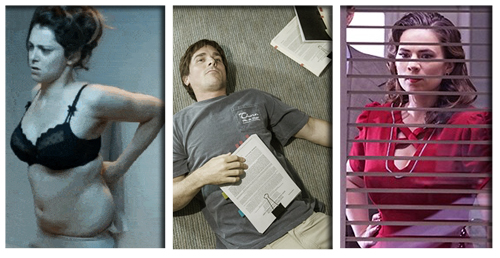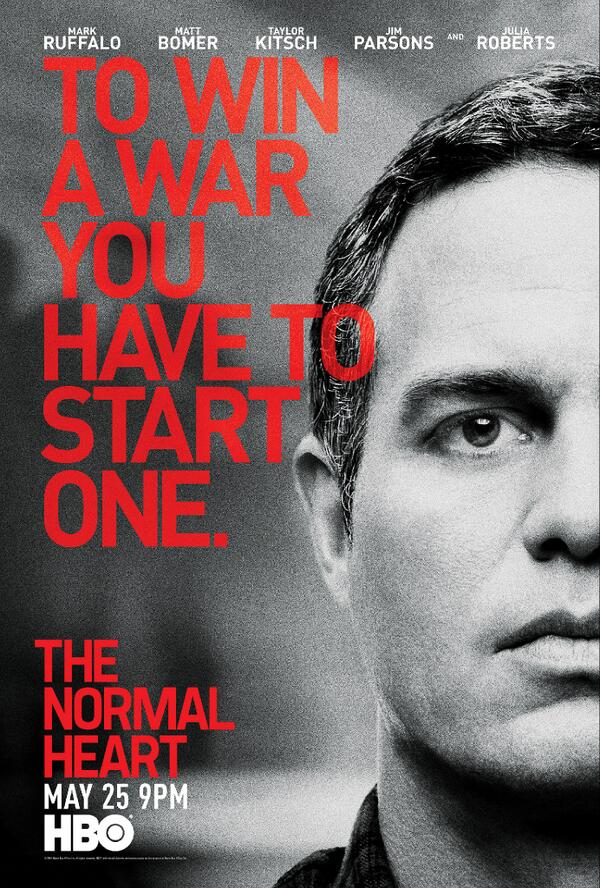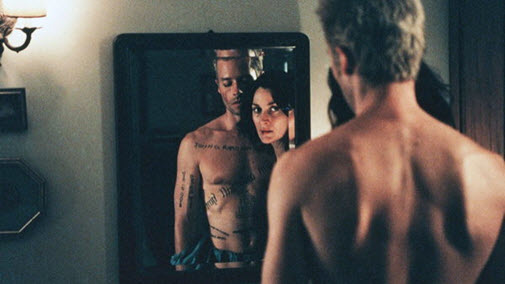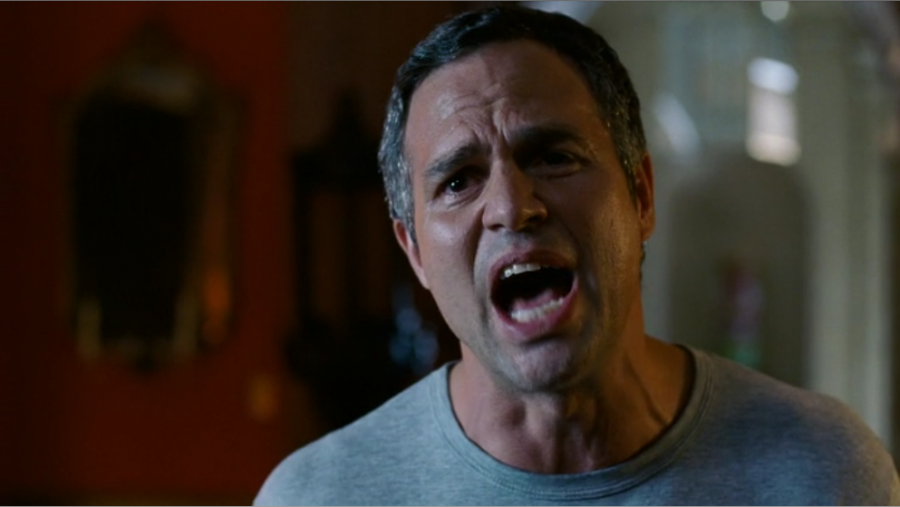Retro Sundance: 2001's Memento
 Wednesday, January 27, 2016 at 10:00PM
Wednesday, January 27, 2016 at 10:00PM When Memento arrived in 2001, it was a total buzzfest: Everyone was talking about it. It had a Wachowski level of cool (even co-starring Wachowski favorites Joe Pantoliano and Carrie-Anne Moss), it had a gritty noir sensibility, and an innovative time-bending structure deftly designed to get you inside the brain-damaged mind of Leonard Shelby (Guy Pearce). It left Sundance that January with the Waldo Salt Screenwriting Award, hit movie theaters in March, and when awards season came it was nominated for an Oscar for the Screenplay (Chris Nolan's first Oscar nomination) as well as the Editing prize. The movie has lost none of its cachet in the intervening years, retaining a 92% “fresh” rating on Rotten Tomatoes, and clocking in at #46 on the IMDb Top 250.
But I have a personal reason for loving this movie, as well as a story (I always have a story) if you'll indulge me after the jump...
Agent Linker
 Wednesday, January 27, 2016 at 6:32PM
Wednesday, January 27, 2016 at 6:32PM W Magazine Rooney Mara loves the sex scene from Rust & Bone. Who knew?
Decider Joe Reid reminds you to catch up with the Golden Globe and Critics Choice winning Crazy Ex-Girlfriend
Guardian wonders who historically accurate The Big Short is... this is such a predictable part of awards season, yes?
Guardian after a bit of rights shuffling the Little House on the Prairie movie is back on
Coming Soon Spider-Man (2017) set for IMAX so you can see Tom Holland real big like when he swings and flips and supers around

EW Matt Smith and Zosia Mamet are going to star in a Robert Mapplethorpe biopic. This is not, as far as we can tell, an adaptation of Patti Smith's Just Kids book, that was supposedly going to be adapted. So perhaps there are competing projects?
Awards Daily on why she thinks The Big Short is going to win Best Picture - short answer: PGA hasn't been wrong yet in this short "preferential ballot" era
MNPP have you heard about the bizarre sounding post 9/11 Michael Jackson/Elizabeth Taylor/Marlon Brando movie to star Joseph Fiennes, Stockard Channing, and Brian Cox respectively. It sounds too strange to be true but it is in fact true. Meanwhile...
Pajiba ... has been on a tear about the casting and shares a funny quote from Orlando Jones pitching Angela Bassett as Liz Taylor. YES PLEASE.
Pajiba on the joys (thus far) of Agent Carter Season 2
Finally...
Ear Candy! The Motion Picture Sound Editing "Golden Reel" Nominations were announced today. No film really led the nominations since Mad Max: Fury Road, The Martian, The Revenant and Star Wars: The Force Awakens all received the same amount of nominations (3). They are all up for both Sound categories at the Oscars, too. Bridge of Spies which was Oscar nominated for Sound Mixing received 1 nomination and Sicario which was nominated for Sound Editing received 2. On the television side, Game of Thrones is the nomination champ. Here's one category I thought was fun to know about:
Feature Film — Music in a Musical
“Love & Mercy” (Nicholas Renbeck)
“Pitch Perfect 2” (Amanda Goodpaster)
“Straight Outta Compton” (Jason Ruder)
And in case you missed the Film Bitch Awards in the sound categories, announced a while back, they are located here.
HBO’s LGBT History: The Normal Heart (2014)
 Wednesday, January 27, 2016 at 4:00PM
Wednesday, January 27, 2016 at 4:00PM  Last week we swooned over Dane DeHaan’s pitch perfect portrayal of a self-serious gay NYC teen in In Treatment and this week we’re returning to what continues to be HBO’s most cherished LGBT theme: the AIDS crisis. We’ve talked about it here, there, and here, here, and yep, here again… Much of this project has been about discovery, but The Normal Heart is still relatively recent and so below find some words I’d dispatched when I first saw it close to two years ago.
Last week we swooned over Dane DeHaan’s pitch perfect portrayal of a self-serious gay NYC teen in In Treatment and this week we’re returning to what continues to be HBO’s most cherished LGBT theme: the AIDS crisis. We’ve talked about it here, there, and here, here, and yep, here again… Much of this project has been about discovery, but The Normal Heart is still relatively recent and so below find some words I’d dispatched when I first saw it close to two years ago.
“And every gay man who refuses to come forward now and fight to save his own life is truly helping to kill the rest of us.” — Ned Weeks
Anger fuels much of The Normal Heart and the play/film’s ability to showcase such raw and seemingly useless feeling is one of the more extraordinary things to come out of Kramer’s life and work. Curmudgeoney as Kramer and Ned Weeks may come off, their anger is not only justified but necessary. It makes for a tacit and probably unintentional meta-nod to have the Hulk himself play him. [More...]
Personal Ballots Continued: Editing, Makeup, Visual FX
 Wednesday, January 27, 2016 at 2:00PM
Wednesday, January 27, 2016 at 2:00PM  I promised daily Film Bitch Award nominations and I aim to deliver since we were supposed to technically be done by now. The best laid plans. Yesterday I shared male acting choices and jazzed up two Oscar charts. Today half of the visual categories have gone up and I've updated the correlative three Oscar charts, too.
I promised daily Film Bitch Award nominations and I aim to deliver since we were supposed to technically be done by now. The best laid plans. Yesterday I shared male acting choices and jazzed up two Oscar charts. Today half of the visual categories have gone up and I've updated the correlative three Oscar charts, too.
FILM EDITING
I'm so disappointed that Academy voters skipped Sicario's Joe Walker in this category so I've rectified that obvious error. Talk about sustaining the tension masterfully for two hours. He's best known for his work with director Steve McQueen and was Oscar-nominated a couple of years ago for 12 Years a Slave. He had a good year since he also edited Blackhat which people found lacking in the emotion and story department but which was quite fine on a craft level. Two editors we interviewed here Nathan Nugent (Room) and Affonso Gonçalves (Carol) are also honored.

VISUAL FX
Look I get that people didn't love The Avengers: Age of Ultron but passing on its visual effects strikes me as pettiness for feeling disappointed and getting Marvel fatigue. This is state of the art superheroics. Looking over my nominees now I'm realizing it was a very good year for robots: Ultron, The Vision, Ex Machina's Ava, and even Tomorrowland's Athena
MAKEUP & HAIR
I mostly adhere to Oscar rules with my traditional categories but not here as I am adamantly opposed to this category being ghettoized the way it is with the Academy. The makeup artists are the ONLY artists with an oscar category that are allowed only 3 nominations. Everyone else gets 5 and that is just messed up since every single film uses a hair and makeup team. With five spots, I have room for both of the high profile Oscar nominees because who can forget Leo's horrific zombie face in The Revenant or smoky eyes reaching their gonzo apotheosis in Mad Max Fury Road. For the other spots I've embraced maximum beauty (Carol), stylish comedy (Spy), and the world's most famous detective (Mr Holmes). Read the writeups here.

*If any makeup artists are reading I'd love a better education on how these departments work on film sets. It's one of the behind the scenes jobs where credits dont feel very consistent from film to film in terms of titles of the players.





